What would happen if the data traces of our childhood were available today? This is a key question for generations to come. Today in the life of families data is everywhere. From doctor’s appointments to toys, from social media to mobile apps, children’s everyday life is recorded, stored and shared in ways that were not possible before. This website is based on the Child | Data | Citizen research project and responds to concerns about children’s data traces and their social and political implications in the age of big data and artificial intelligence.
Latest News
Children and AI Agents?
During the Fall, I have contributed to the targeted consultation of the research community launched by the European Commission. The initiative is aimed at identifying the challenges and risks associated to children digital use and experience in a digital environment and collectively designing the best way to promote, protect, respect and fulfil children rights in […]
The Human Error Project: Expanding the Debate

Researching the datafication of family life and the impact of tech on children’s rights in the Child Data Citizen project led me to a new research exploration. As I listened to parents telling me how they were being falsely ‘read’ or ‘understood’ by algorithms crunching their data traces, and analyzed the impacts of inaccurate automated decisions […]
Children Data Rights: a Canadian step forward

In March 2021, I had the pleasure to share insights from my project Child Data Citizen in an interview with CSA Group and Springboard Policy from Canada. The fruit of their research dedicated to Children’s Privacy in the Age of Artificial Intelligence just got released. This interview was the occasion to specifically focus on the […]
First review on Science !

“Child Data Citizen is a timely wake-up call for anyone who cares for and about children in the 21st century” says Kate Eichhorn in Science. I was honored to read how Science reviewed the themes of my book and underlined how the critical implications of our families being turned into data are not losing their relevance […]
